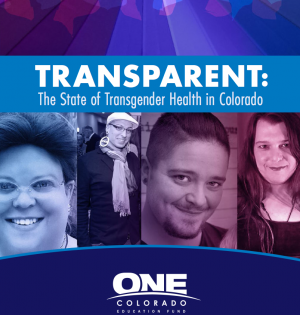Leo Kattari, One Colorado
Many Coloradans experience barriers to accessing the health care coverage and services they need, and this is no different for transgender Coloradans. However, due to the lack of data on transgender people – or people whose sex at birth is different than the gender they know themselves to be – we did not know the true extent of the health disparities that transgender Coloradans experience on a daily basis.
In the spring of 2014, One Colorado, The GLBT Community Center of Colorado, the Colorado Department of Public Health and Environment, and the member organizations of the Colorado LGBT Health Coalition launched the Colorado Transgender Health Survey. This survey was developed to mirror the U.S. Centers for Disease Control and Prevention (CDC)’s Behavioral Risk Factor Surveillance System (BRFSS), so that we can have a stronger sense of how the health outcomes of transgender Coloradans compare to those of the general Colorado population.
This November, One Colorado was proud to release our groundbreaking new report, Transparent, which highlights the barriers that transgender Coloradans face in getting the health care they need. This report is the first of its kind on the health concerns of transgender people at the state level.
Some of the key findings in Transparent include:
- The Affordable Care Act – specifically the expansion of Medicaid in Colorado – greatly increased the number of transgender Coloradans who are covered, which means more transgender people will have access to consistent health care. Still, many transgender people indicated that they had delayed needed care due to cost, not having insurance, or having inadequate coverage.
- While the physical health of transgender Coloradans may be similar to the general Colorado population, the mental health statistics are drastically different – due in no small part to the powerful societal and systemic barriers they face. Transgender Coloradans report alarmingly high rates of depression, thoughts about committing suicide, and suicide attempts. In fact, transgender Coloradans are almost 6 times more likely to report current depression and 4 times more likely to report ever having an anxiety disorder than the general population.
- A major indicator of the health and well-being of transgender Coloradans is having access to a transgender-friendly health provider. When a patient perceives their provider to be someone they can trust, the likelihood that they will receive quality care is higher. This underscores the importance of Colorado’s health providers providing care and services that are culturally responsive and clinically competent.
While Colorado has seen incredible progress for access to health care and coverage for transgender Coloradans, this report reminds us that we still have a long way to go in ensuring that all Coloradans receive the care, treatment, and coverage they deserve.

